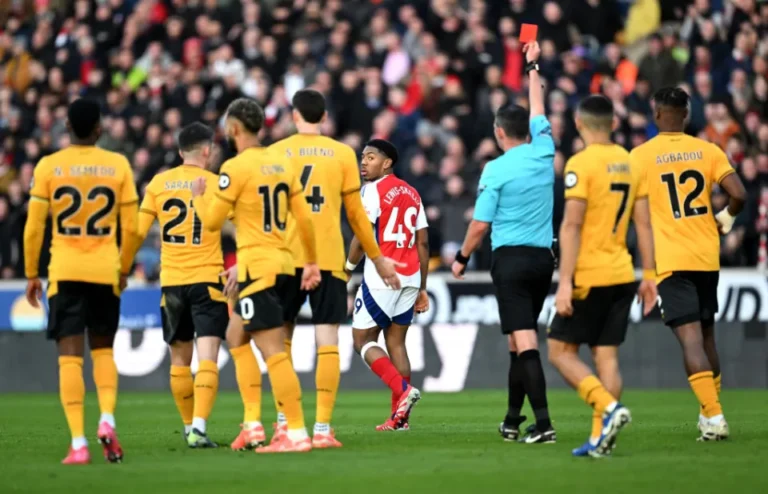
Football fans were left debating a controversial red card shown to Arsenal’s Myles Lewis-Skelly during their Premier League clash against Wolves at Molineux. The incident, which occurred just two minutes before halftime, drew widespread attention, prompting the Premier League to release a statement explaining why VAR upheld the referee’s decision. Referee Michael Oliver issued a straight red card for Lewis-Skelly’s challenge on Wolves’ Matt Doherty, deeming it serious foul play rather than denying a goal-scoring opportunity. Following a review at Stockley Park, VAR confirmed the decision, ruling there was no clear and obvious error.
The decision divided opinion, with Arsenal fans expressing frustration over what they saw as an overly harsh punishment. The red card not only affected Arsenal’s performance for the remainder of the game but also left Lewis-Skelly facing suspension unless an appeal is successful. Arsenal may contest the ruling in hopes of overturning the ban and reinstating the young midfielder for upcoming matches.
This isn’t the first time Michael Oliver has been involved in a controversial decision affecting Arsenal. Earlier in the season, he sent off Leandro Trossard for time-wasting against Manchester City, reigniting debates over the consistency and interpretation of refereeing decisions.
Losing Lewis-Skelly was especially challenging for Arsenal, given their ongoing injury problems. With several key players already sidelined, his suspension further complicates Mikel Arteta’s tactical plans. The manager’s ability to adapt will be closely scrutinized as Arsenal navigates this difficult phase of the season.
The controversy unfolded alongside other notable moments, including Wolves’ Matheus Cunha making headlines with a personal announcement before the match, adding intrigue to an already intense game. Arsenal’s efforts to manage the match while a player down highlighted their resilience, though the red card undoubtedly altered the dynamics of the contest.
Beyond the pitch, Arsenal continues to engage with its fan base through digital platforms like their WhatsApp channel, providing updates, insights, and podcasts to keep supporters informed and connected. This emphasis on transparency and accessibility reflects the club’s commitment to strengthening ties with fans in a digital age.
The red card also reignited broader debates about VAR and refereeing standards in the Premier League. While VAR was designed to improve decision-making, its implementation remains polarizing, with incidents like this one raising questions about its effectiveness and consistency. The league reiterated that VAR’s role is to intervene only when a clear and obvious error occurs, but this explanation did little to appease those frustrated by the decision.
Arsenal’s supporters, already frustrated by previous contentious calls under Michael Oliver, have pointed to a pattern of decisions they believe unfairly impact their team. Whether such perceptions are justified or not, they continue to fuel discussions about fairness and officiating in the league.
Looking ahead, Arsenal’s ability to overcome setbacks like this will be crucial to their ambitions this season. With injuries and suspensions testing the squad’s depth, Mikel Arteta’s strategic acumen and the team’s resilience will play pivotal roles in maintaining their competitive edge.
As discussions about VAR and refereeing persist, the incident at Molineux serves as a reminder of the complexities of modern football, where technology, human judgment, and emotional investment intersect. For Arsenal, the challenge lies in using this moment to foster growth, unity, and determination both on and off the field, as they strive to stay on track toward their season’s goals.
Leave a Reply